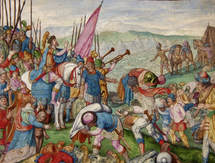|
Early in the spring of 2002, I was worshiping uneasily at a men’s conference before teaching. I’d been troubled with physical problems, having a hard time controlling my fears and getting into singing. After several songs, the worship leader—whom I had not met—paused before stepping down, then turned to look at me as I sat before him on the front row.
“Gordon, the Lord is giving me a word for you,” he declared matter-of-factly, and began speaking: “You will live and not die, and declare the glories of the Lord.” As he continued with a deeply encouraging word for my future ministry, a peace settled over me, and my teaching flowed with surprising power and grace. I could not know then how this simple word would frame my ministry today. Recently, fifteen years later, Mary and I felt led to incorporate as a non-profit organization in order to help focus our ministry and allow for donations. We wanted the name to reflect our emphasis on both healing and spiritual warfare. As we prayed and began brainstorming for a name, however, nothing rang true. Several times over the year, we tried again and again, to no avail. Eventually, we had everything necessary to file for incorporation except the name. Frustrated at this roadblock, we could only give it up to the Father. Some months later that fall, as I was finishing my book on the spiritual battle for marriages today, I came under heavy attack. Praying determinedly for the Father’s victory, I remembered a Scripture which had seized my imagination when I first read it forty years earlier in seminary. The story opens in 2 Chronicles 20 with a large coalition of Canaanite armies amassing to attack Israel. “Alarmed” at facing such overwhelming odds, King Jehosophat calls for a fast throughout Jerusalem and gathers everyone in the city before the Temple. There, he cries out in desperation to God, citing the Passover and His other saving acts in their history to remind that “power and might are in Your hand, and no one can withstand You” (:6). As the crowd then waits expectantly, “the spirit of the Lord” speaks through a priest, who proclaims, “You must not be afraid or discouraged to face this large army. The battle depends on God, not on you” (:15TEV). Fortified, the Israeli forces seize the initiative, and early the next morning they gather to march out against this huge army. But before they set out, Jehosophat consults with the people and comes up with a startling last-minute strategy: The king ordered some musicians to put on the robes they wore on sacred occasions and to march ahead of the army singing, “Praise the Lord! His love endures forever! (chesed)” When they began to sing, the Lord threw the invading armies into a panic…(and) they turned on each other in savage fighting. (:22,23 TEV, NIV italics mine) When the Israelite army marches courageously over the hill to fight, “they looked toward the enemy, and saw that they were all lying on the ground dead. Not one had escaped” (:24TEV). The worship song which the warriors sang, which led the forces of God and routed the enemy, was Psalm 118. Unto today, that Psalm is recited by Jews at the Passover, which celebrates God’s supernatural deliverance from the angel of death before leading them out of slavery in Egypt. It’s a song of overwhelming warfare and deliverance. But its power and victory focus not on the enemy, nor even on any violent or vengeful character of God. Rather, this song of salvation is about God’s love for His people—and His readiness to demonstrate that love in saving acts against powers of evil and destruction. After almost a year of praying and searching to name our corporation, I realized at last that this Hebrew word chesed, used in Psalm 118 and so often elsewhere in the Old Testament, embodies perfectly both the warfare and healing dimensions of our ministry. It’s the fundamental character of the Father, namely, “steadfast enduring love” as translated in Judaism: The Tanakh (The Jewish Publication Society, 1988). It’s a love that depends not on our uncertain performance, but rather, on the Father’s unwavering heart for us as His children. Chesed is about grace. It means that our Father’s love for us is secure, and thereby enables our performance. In fact, it’s the Good News of our Christian faith: not that we’re so good, but that God is so good. When we start there, our journey of faith and its destiny is assured. As the embodiment of enduring love, chesed is “the missing link between Old and New Testaments, the Rosetta Stone that enables Christians to own our Hebrew roots and rediscover Jesus’ true mission,” as author Keith Hueftle declares in The Trouble with Grace: A Study of Its Multi-Dimensional Hebrew Root Khesed. Just this past week after filing our corporation papers, I felt led to read Psalm 118 again. When I came to verse 17, I was transfixed, and sat up in astonishment. There before me lay the marvelous confirmation of chesed in virtually the same words that were prophesied over me fifteen years ago, during worship in my personal battle against great stress: I will not die but live, and will proclaim what the Lord has done…. Give thanks to the Lord, for he is good; his love endures forever (Psalm 118:17, 29 NIV). |
Gordon DalbeyGordon Dalbey is an ordained minister, published author, and international speaker. Gordon has been a Peace Corps Volunteer in Nigeria, high school teacher in Chicago and San Jose (CA), and pastor in Los Angeles. He holds an M.Div. from Harvard, an M.A. in journalism from Stanford, and a B.A. from Duke. CategoriesGod's loving-kindness is that sure love which will not let Israel go. Not all Israel's persistent waywardness could ever destroy it. Though Israel be faithless, yet God remains faithful still. This steady, persistent refusal of God to wash his hands of wayward Israel is the essential meaning of the Hebrew word which is translated as loving-kindness, loyalty, goodness, and steadfast love. |
Site powered by Weebly. Managed by FreeLogoServices.com

 RSS Feed
RSS Feed
